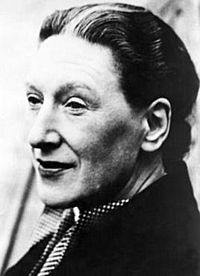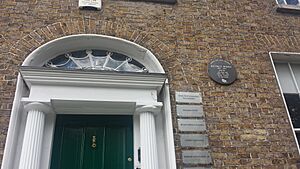Elizabeth Bowen facts for kids
Quick facts for kids
Elizabeth Bowen
|
|
|---|---|
 |
|
| Born | Elizabeth Dorothea Cole Bowen 7 June 1899 Dublin, Ireland |
| Died | 22 February 1973 (aged 73) London, England |
| Resting place | Saint Colman's Church, Farahy |
| Language | English |
| Notable works | The Last September (1929) The House in Paris (1936) The Death of the Heart (1938) The Heat of the Day (1949) Eva Trout (1968) |
| Spouse | Alan Cameron (1923–1952; his death) |
Elizabeth Bowen (born June 7, 1899 – died February 22, 1973) was an Irish-British writer. She wrote many novels and short stories. She was known for her books about large Irish country houses. She also wrote about life in London during wartime.
Contents
Who Was Elizabeth Bowen?
Elizabeth Dorothea Cole Bowen was born in Dublin, Ireland, on June 7, 1899. Her father, Henry Charles Cole Bowen, was a lawyer. Her mother was Florence Isabella Pomeroy.
Elizabeth spent her summers at her father's family home, Bowen's Court, in County Cork. In 1907, her father became unwell. Elizabeth and her mother moved to England. They settled in Hythe, Kent.
Sadly, her mother passed away in 1912. Elizabeth was then raised by her aunts. She went to Downe House School. After trying art school, she decided she wanted to be a writer. She became friends with writer Rose Macaulay. Rose helped her find a publisher for her first book. It was a collection of short stories called Encounters, published in 1923.
Her Life as a Writer
In 1923, Elizabeth married Alan Cameron. He worked in education and later for the BBC. They first lived near Oxford. There, Elizabeth wrote some of her early novels. One of them was The Last September (1929).
Later, they moved to London. She wrote more famous books there. These included The House in Paris (1935) and The Death of the Heart (1938). In 1937, she joined the Irish Academy of Letters. This is a group of important Irish writers.
In 1930, Elizabeth inherited Bowen's Court. She was the first woman in her family to own it. She still lived mostly in England but visited Ireland often. During World War II, she worked for the British government. She reported on what people in Ireland thought about the war.
During and after the war, she wrote about life in London. Her books showed what it was like during the bombing raids. These included The Demon Lover and Other Stories (1945) and The Heat of the Day (1948). She was given an award, the CBE, for her work.
Later Years and Legacy
In 1952, her husband retired. They moved to Bowen's Court, but he passed away a few months later. Many famous writers visited her there. These included Virginia Woolf and Iris Murdoch.
Elizabeth found it hard to keep the house. She gave talks in the United States to earn money. In 1959, she had to sell Bowen's Court. The house was torn down in 1960. After that, she lived in different places for a while. In 1965, she settled back in Hythe, Kent.
Her last novel was Eva Trout (1968). It won a major award, the James Tait Black Memorial Prize, in 1969. She also helped choose the winner for the Booker Prize in 1972.
Elizabeth Bowen developed lung cancer in 1972. She passed away on February 22, 1973, at age 73. She is buried with her husband in Ireland. Their grave is near Bowen's Court.
After her death, her life and work continued to be important. Books have been written about her. Special plaques have been put on her former homes in England. These plaques remember where famous people lived.
What Did Elizabeth Bowen Write About?
Elizabeth Bowen was interested in how people's lives change. She wrote about what happens when things that seem calm suddenly become messy. She also explored secrets and betrayals hidden behind a polite appearance.
Her writing style was very detailed and artistic. She loved movies and used ideas from filmmaking in her books. The places where her stories happened were very important. They often affected the characters' feelings and the plot. Her war novel, The Heat of the Day, is a famous book about London during World War II bombings.
She also wrote great ghost stories. Many people thought she was one of the best ghost story writers of her time. Her story 'The Demon Lover' is a well-known example.
Selected Works
Novels
- The Hotel (1927)
- The Last September (1929)
- Friends and Relations (1931)
- To the North (1932)
- The House in Paris (1935)
- The Death of the Heart (1938)
- The Heat of the Day (1949)
- A World of Love (1955)
- The Little Girls (1964)
- Eva Trout (1968)
Short Story Collections
- Encounters (1923)
- Ann Lee's and Other Stories (1926)
- Joining Charles and Other Stories (1929)
- The Cat Jumps and Other Stories (1934)
- Look at All Those Roses (1941)
- The Demon Lover and Other Stories (1945)
- Ivy Gripped the Steps and Other Stories (1946, USA)
- Stories by Elizabeth Bowen (1959)
- A Day in the Dark and Other Stories (1965)
- The Good Tiger (1965, a children's book)
- Elizabeth Bowen’s Irish Stories (1978)
- The Collected Stories of Elizabeth Bowen (1980)
- The Bazaar and Other Stories (2008)
Nonfiction Books
- Bowen's Court (1942, 1964)
- Seven Winters: Memories of a Dublin Childhood (1942)
- English Novelists (1942)
- A Time in Rome (1960)
- Afterthought: Pieces About Writing (1962)
Books Made into Movies and TV Shows
- The House in Paris (BBC, 1959)
- The Death of the Heart (1987)
- The Heat of the Day (Granada Television, 1989)
- The Last September (1999)
Images for kids
-
St Colman's Church, Farahy, County Cork, where Elizabeth Bowen is buried.
See also
 In Spanish: Elizabeth Bowen para niños
In Spanish: Elizabeth Bowen para niños
 | Valerie Thomas |
 | Frederick McKinley Jones |
 | George Edward Alcorn Jr. |
 | Thomas Mensah |



